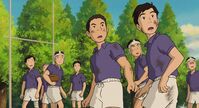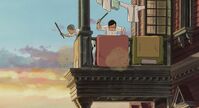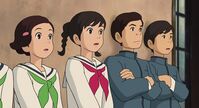Most of Miyazaki's films feature little girls as the protagonists, because he said that things like paradise only existed in my childhood, only in the memory of my childhood. So he wants to make movies that reflect the happy boyhood, when little boys of that age are prone to fall into all kinds of traps in society - collecting boring cards, indulging in boring remote control cars, and instantly falling prey to commercialism, They have a hard time seeing inside themselves. Girls are different, they live in society very confidently.
Miyazaki Goro's "Slope of Poppy Blooming" also continues the narrative angle of the little girl as the protagonist. Meru's father died in the Korean War, and her mother went to the United States to study as soon as she was able to take care of herself. Mei Lu has to take care of the five or six people who live with her alone. She gets up early every day and raises the signal flag waving for the sea ship, hoping to show her father, who may be sailing at sea, the direction to go home. She prepares breakfast for the whole family, washes everyone's clothes, and packs everything before going to school. When I get home in the evening, I have to cook dinner for the whole family. One of the critics of the movie is that in addition to Mei Lu's sister and grandma who must take care of her, there are three adults who have not disclosed their identities and relationships, and they never need to take care of housework and have nothing to do with the whole story. It seems that the only value of their existence is to make people feel more sympathetic to the hard-working Meru.
Mei Lu met the boy Kazama at school, and Kazama was mimeographing their club's school magazine, Fake Weekly, in the school's literature and art department. The poem written to the girl Mei Lu in the weekly magazine and their invitation from Kazama made her decide to join the literary and art club with only two people. Therefore, Mei Lu needs to juggle the housework of a family of seven and the lettering work of the mimeograph weekly. She never complained about the hardships of life, the only thing she remembered was her father who might survive.
All the clubs in the school are concentrated in one old building. The students named it the Latin Quarter, and it was the place where they felt the most freedom. The school decided to demolish the Latin Quarter because the chairman wanted to build a club here. The students thoroughly cleaned and painted the entire building in order to protect their cultural sacred place, and at the same time recommended three classmates from the Arts Department to go to Tokyo to meet the chairman. After hearing about Mei Lu's life experience, the chairman agreed to visit the campus before deciding whether to tear down the Latin Quarter. (This episode is so weak that I have to complain, why ask about the girl's family background?)
Of course, the end of the matter is still very happy. Perhaps to make the story more twisty, Mei Lu and Kazama, who like each other, may actually be brothers and sisters. "Blue Life and Death" is bizarrely staged, although it is also proved that they are not brothers and sisters in the end. In order to make the story more complete, I have to pull out the brotherhood of the fathers on both sides. The director wants to talk too much, and laboriously tells a few stories. Too much force makes the whole movie look like there is no main line, and it cannot please many audiences.
Hayao Miyazaki once said that what I want to make is a movie that makes children feel like "Although I haven't been there and haven't seen it, this world is so beautiful". In this sense, Wu Lang should have not disappointed his father. At least, I think Tokyo before the Olympic Games in the cartoon is still very beautiful.
Miyazaki Goro's girl is still different from Miyazaki's girl. In "Spirited Away", the little girl in search of her parents who turned into pigs because of endless material desires and greed, persistently and bravely embarks on an unknown journey; while the girl Mei Lu in "Blooming Hillside with Poppies" is a kind of silent With the belief that tomorrow will be better, she waited for the news that her father might survive, and waited for her mother to return to her side, and at the same time, she took on the burden of the family. Wu Lang said that this is a kind of optimism under great pessimism, a somewhat negative effort, and an unavoidable difference between father and son living in different eras.
From Miyazaki's insistence on making films by hand-painting in the era of fast-moving consumption, it is not difficult to see his dissatisfaction with this morbid society that endlessly destroys the environment just for economic development. He believes that Japan is a country with more consumers than producers. Although people sometimes work hard, they spend most of their time consuming things made by others and enjoying it. That’s how we live. The girls in the Miyazaki family movies can make us reflect on whether we are too pampered ourselves and forget to care about the people and the environment around us.
Some people say that the three poisons of modern society are: consumerism, success and sexual freedom. The cartoons produced by Studio Ghibli are like a thin thread, trying to save us who are dragged by fashion and brands into the endless consumption whirlpool of purchase and elimination. Such efforts are worthy of respect.
View more about From Up on Poppy Hill reviews











